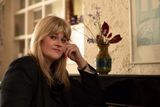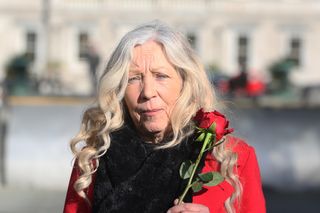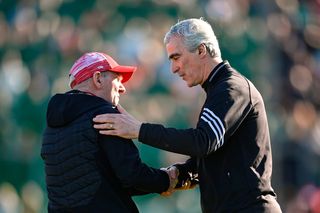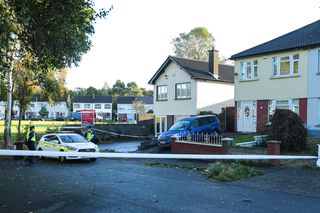Dermot Bolger can't get enough of... That seventies show
Bell bottoms ruled, Travolta was king, and the pope dropped by for a quick visit. Writer Dermot Bolger on why he can't get enough of the decade of anarchy.
Even today the sound of Stayin' Alive by the Bee Gees or Le Freak by Chic instantly brings flashbacks of elephant flares, tank tops and having my arm twisted behind my back while a Garda Siochana pressed my face against a squad car.
Admittedly this experience doesn't encapsulate the 1970s for most people, but it happened to me a lot. As teenagers, a friend and I decided to stage an arts festival in Finglas. We had barely pasted our first poster onto a hoarding on Main Street when the squad car appeared, two policemen us pinned down and one screamed in my ear, "Is it political?"
"It's art," I replied, terrified. He gazed at the poster like I was an imbecile, said, "Don't do it again," and drove off. But whatever I was inadvertently doing in the 1970s I seemed to keep doing it. Some months later I was pinned against another squad car in Slane, on suspicion of being a burglar when I searched for the abandoned cottage (now a beautiful museum) where Francis Ledwidge was born. I needed to recite two Ledwidge poems before the garda (a thoroughly decent, honourable man) accepted my bona fides as a literary pilgrim and not a housebreaker.
An off-duty policeman in Tuam was less gentlemanly soon afterwards when I stepped down off a Bus Éireann coach to give a poetry reading. I thought he was from the local arts group until he flung me against the bus, insinuating in monosyllabic Neanderthal grunts that Tuam had no room for the likes of me and I should re-board my bus.
There were two ways to dress in the mid-1970s. You could dress like John Travolta in Saturday Night Fever, in haute couture so glistening that your mother needed to don sunglasses to wave you off to the disco. Or you could dress like me in an old army jacket, a check shirt that even Rory Gallagher would discard as too tattered and long hair that last saw a comb at your First Communion.
As a rule of delineation, John Travolta could visit Tuam without being flung against a bus.
But clashing with authority figures and conservative attitudes was part of the joy of being young in 1970s Ireland. Donogh O'Malley's introduction of free Second Level education in 1969 changed Ireland so much that nuns in one Dublin convent school included a prayer for "the poor misguided soul of Donogh O'Malley" among the morning prayers.
Suddenly working-class families were completing our Leaving Certificates and taking a caustic look at the laws we were expected to live by.
I associate the 1970s with illegality, in that I grew up in a generation who found the existing ethos so disconnected to our lives that we invented a parallel Ireland to live in. To hear our music we tuned into illegal pirate radios broadcast from tiny studios hidden in unlikely places - I remember one located beneath the floorboards of a snooker hall.
I queued to illegally buy condoms at a vending machine at the Trinity College Students' Union offices, in the vain hope that I might actually require them.
As a factory hand, this was my sole brush with Third Level education. I brought my girlfriends to dance in solidarity in a hidden gay club when simply being gay was illegal.
In school a reactionary teacher lectured us on how family planning "broke the natural order"; a temporary teacher described Daniel O'Connell as "a so-called Irishman" while younger teachers filled us with enthusiasm and self-confidence.
A cultural war occurred for hearts and minds and in 1977 punk embodied that freedom. We realised that we needed to control the means of production. Writers like Neil Jordan started the Irish Writers Co-op. Provocative bands like The Virgin Prunes pushed the boundaries of music. The late Paul Funge ran a brilliantly chaotic arts festival from the back of his family's shoe shop in Gorey.
Dublin's Project Arts Centre began a hotbed of frenzied artistic activity: actors like Gabriel Byrne and Liam Neeson learnt their trade there while performance artists caused consternation by rolling naked in flour. It became the site of vehement reactionary pickets, with Fianna Fail Councillor Ned Brennan denouncing a gay theatre company as 'funny bunnies'.
This clash of cultures reached its blackly comic climax in 1978 when RTE television broadcast its first brief glimpse of an Irish female breast and The League of Decency's founder dropped dead of the heart attack.
I was involved with an underground magazine, and his death - while undoubtedly tragic to his family - caused global mirth to cartoonists, some of whose drawings we reprinted. When we reprinted a banned Robert Ballagh self-portrait of himself as a flasher gardai descended into our basement, claiming we'd be banned for obscenity. But banning was too blunt a weapon. Instead they urged newsagents to return all copies to us unsold and quietly put us out of business.
The decade ended with Pope John Paul arriving to kiss the ground and walk on the women in 1979. Walking into town on the day of the Papal Mass I didn't meet a soul. But two military helicopters swooped down to take a look at me, as if puzzled by why I was not among the million people in the Phoenix Park. People remember the visit for the Pope being flanked by two errant fathers in Eamon Casey and Michael Cleary in Galway. But gay men have told me how they finally came out during his Mass in the Phoenix Park when they encountered equally isolated gay men from small towns in the gent's toilets, while their families listened to John Paul's homily.
It's an incongruous image; a head-on collision between Ireland's previous outward respectable piety and the complex reality that human beings have different desires and destinies.
But for me incongruity and contradiction was what the 1970s were all about: rows. I recall the 1970s as a time of liberation when a new generation began to ignore their elders and create our own culture.
It was a time of frenetic energy, occasional violence at manic gigs and argument and change as a new generation started to think for ourselves and enjoyed as much fun and anarchy as people can have while corralled inside enormous pairs of elephant flares.
Dermot Bolger's new novel, 'Tanglewood', is published May 1.
Join the Irish Independent WhatsApp channel
Stay up to date with all the latest news














